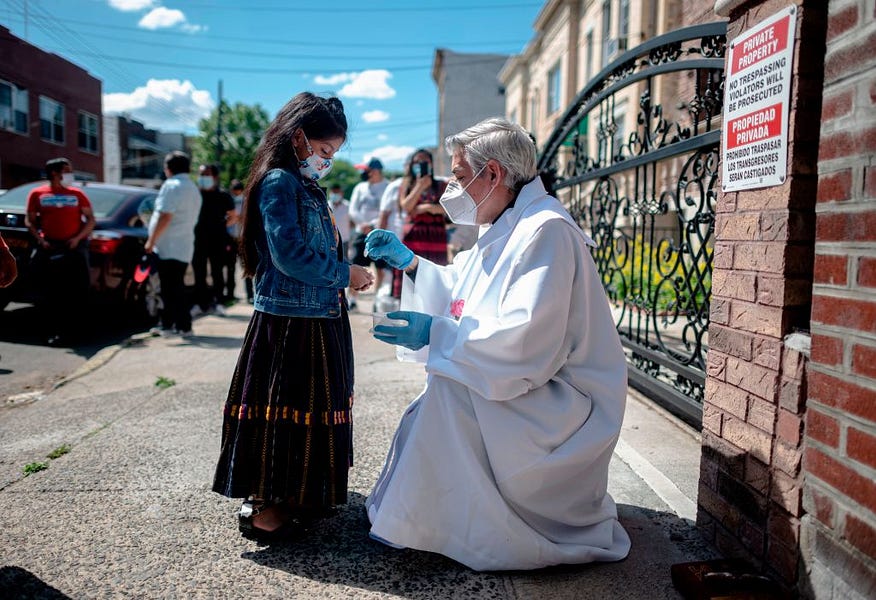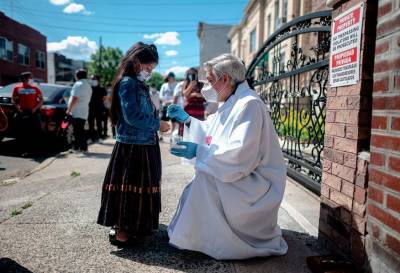As an ugly conspiracy theory re-emerges, we stand at a “never again” moment.
The “great replacement theory” is gaining traction far too close to the American mainstream. This conspiracy theory suggests that welcoming immigrants is part of a plan to replace the political power and culture of white people living in Western countries.
As the bishop of El Paso, Texas, one of us is all too familiar with the hate and violence this conspiracy theory has inspired: On Aug. 3, 2019, a white terrorist killed 23 people in a shooting at a Walmart in El Paso. In his manifesto, the shooter mentioned the great replacement theory and said he feared a “Hispanic invasion of Texas.”
It was another in a string of violence tied to the theory: the August 2017 white supremacist rally in Charlottesville, Virginia, during which Heather Heyer was killed; the October 2018 synagogue attack in Pittsburgh that claimed 11 lives; the March 2019 terrorist attacks on mosques in New Zealand that left 51 people dead.
The theory has moved from the so-called fringes of society to even some members of Congress, as well as prominent television commentators. But it is far from new: Its roots date to the late 19th and early 20th centuries, when it helped give rise to national socialism in Germany and its murderous horrors.
In 1916, Madison Grant, a eugenicist, conservationist, and promoter of scientific racism, wrote The Passing of the Great Race. The book promoted the superiority of the white, Nordic, Aryan “race” in Northern Europe and warned that it was being threatened by “inferior” races.
Grant was also a major proponent of immigration restriction–his ideas had a part in the restrictionist 1924 Immigration Act. Even more to the point, his ideas caught on in Germany: Adolf Hitler called Grant’s book “my bible.”
White supremacists continue to quote Grant today, and his ideas inform great replacement theory. Too many of our fellow citizens appear vulnerable to the fear that great replacement theory inspires, a fear of those different from us. As Christians, we believe that such fear is damaging to us personally as well as to the fabric of our churches and communities. In the spirit of the welcoming love and hospitality of Jesus, which animates the mission of the church, we must oppose the great replacement theory’s message.
How do we do that? The answer lies not in castigating our family, friends, and neighbors who may have been unduly influenced by the narratives of fear and uncertainty that allow the theory to take hold. Rather, we must reach out, make connections, and illuminate a better path forward, grounded in the Gospel.
Our desire should be to influence life in our nation in ways that reflect the love of Jesus, who taught us to “welcome the stranger” (Matthew 25:35) and “love your neighbor as yourself” (Mark 12:31). While national immigration policy is complicated and our government has a job to do in both securing the border and enforcing the rule of law, we also must reject any kind of demonizing fear-based rhetoric concerning our immigrant neighbors.
The parable of the Good Samaritan also can help us. This is the story of someone (a Samaritan) who takes time to notice another person (a Judean) beaten by robbers and left for dead on the side of the road. Jesus tells this story not just to inspire us to be more charitable with the downtrodden, but to show us that neighborly love, and divine love, crosses lines of ethnicity and is welcoming of everyone.
This is the type of person we must choose to be if we have any hope of functioning as a cohesive society. In 1990, former President Ronald Reagan spoke of the United States as unique in the world precisely because we welcome immigrants of all races, creeds, and backgrounds — representing a “brotherhood of man”:
… The truth of the matter is, if we take this crowd and if we could go through and ask the heritage, the background of every family represented here, we would probably come up with the names of every country on earth, every corner of the world, and every race. Here is the one spot on earth where we have the brotherhood of man. And maybe as we continue with this proudly, this brotherhood of man, made up from people representative of every corner of the earth, maybe one day boundaries all over the earth will disappear as people cross boundaries and find out that, yes, there is a brotherhood of man in every corner.
And in a speech last year to commemorate those lost on 9/11, former President George W. Bush spoke about the nation’s unity following that terrible event:
“At a time when nativism could have stirred hatred and violence against people perceived as outsiders, I saw Americans reaffirm their welcome to immigrants and refugees. That is the nation I know. This is not mere nostalgia; it is the truest version of ourselves. It is what we have been — and what we can be again.”
Those who promulgate the great replacement theory dishonor the Scriptures, our nation’s best aspirations and the unifying idea of a “brotherhood of man.”
The reality is that many of our families, churches, neighborhoods, schools, and towns are already composed of immigrants, and we are learning to live well together all across our country. The only “replacement” we need is to exchange any growing fear and animosity, where it is found, with neighborly love and hospitality as we build and renew our communities together.
The Most Rev. Mark J. Seitz is bishop of the Catholic Diocese of El Paso, Texas. Alan Cross is a Southern Baptist pastor based in California who has written extensively on the role of the church in race relations.






Please note that we at The Dispatch hold ourselves, our work, and our commenters to a higher standard than other places on the internet. We welcome comments that foster genuine debate or discussion—including comments critical of us or our work—but responses that include ad hominem attacks on fellow Dispatch members or are intended to stoke fear and anger may be moderated.
With your membership, you only have the ability to comment on The Morning Dispatch articles. Consider upgrading to join the conversation everywhere.